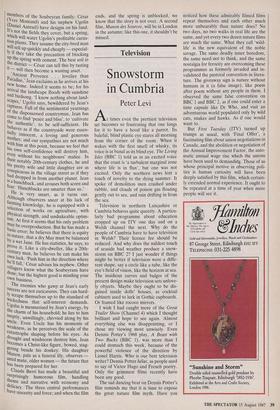Television
Snowstorm in Cumbria
Peter Levi
At times even the prettiest television set becomes so frustrating that one longs for it to have a hood like a parrot. Its baleful, blind plastic eye stares all morning from the corner of the room. When it wakes with the first smell of whisky, its voice is as banal as its blind eye. The Living Isles (BBC 1) told us in an excited voice that the coast is 'a turbulent marginal zone where life is in flux', but one was not excited. Only the northern news lent a touch of novelty to the dying summer. It spoke of demolition men crushed under rubble, and clouds of poison gas floating gently out to sea, and rain drifting in from the sea.
Television in northern Lancashire or Cumbria behaves quite queerly. A particu- larly bad programme about education cropped up on ITV one day and on a Welsh channel the next. Why do the people of Cumbria have to have television in Welsh? Their licence fee should be reduced. And why does the mildest touch of seaside bad weather produce a snow- storm on BBC 2? I just wonder if things might be better if television were a diffe- rent shape, say a circle like a tube, like the eye's field of vision, like the horizon at sea. The insidious curves and bulges of the present design make television sets unlove- ly objects. Maybe they ought to be dis- guised inside dolls' houses, as cocktail cabinets used to lurk in Gothic cupboards. Or framed like rococo mirrors.
I wish I had caught more of the Great Trailer Show (Channel 4) which I thought brilliant and hope to see again. Almost everything else was disappointing, or I chose my viewing most unwisely. Even Dennis Potter's 1968 play, A Beast with Two Backs (BBC 1), was more than I could stomach this week, because of the powerful violence of the direction by Lionel Harris. Who is our best television writer? Dennis Potter helas, as people used to say of Victor Hugo and French poetry. Only the grimmest films recently have been any good.
The sad dancing bear on Dennis Potter's film reminds me that it is time to expose the great nature film myth. Have you noticed how these admirably filmed films repeat thethselves and each other much more unbearably than nature does? No two days, no two walks in real life are the same, and yet every two dozen nature films are much the same. What they call 'wild- life' is the new equivalent of the noble savage. The same deadly inner boredom, the same need not to think, and the same nostalgia for ferocity are overcoming these programmes as formerly invaded and in- validated the pastoral convention in litera- ture. The giveaway sign is nature without humans in it (a false image), like poem after poem without any people in them. I observed the same false convention on BBC 1 and BBC 2, as if one could enter a time capsule like Dr Who, and visit an adventurous world populated only by wild cats, snakes and hawks. As if one would want to.
But First Tuesday (ITV) turned up trumps as usual, with 'Final Offer', a fascinating film about union negotiations in Canada, and the abolition or negotiation of the Annual Improvement Factor, the auto- matic annual wage rise which the unions have been used to demandidg. Those of us whose principal motive in observing poli- tics is human curiosity will have been deeply satisfied by this film, which certain- ly extended normal experience. It ought to be repeated at a time of year when more people will see it.


















































 Previous page
Previous page